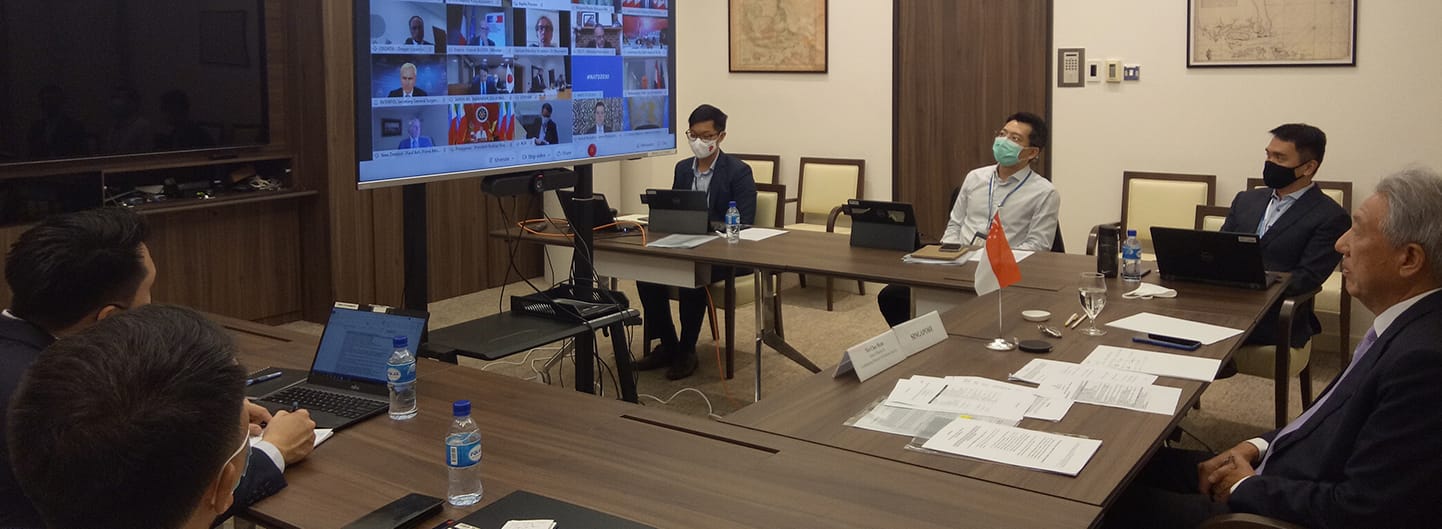SM Teo Chee Hean at the Aqaba Process Virtual Meeting on COVID-19 Response
SM Teo Chee Hean
Economy
Healthcare
Safety and security
2 September 2020
Intervention by SM Teo Chee Hean at the Aqaba Process Virtual Meeting on COVID-19 Response on 2 September 2020.
This article has been migrated from an earlier version of the site and may display formatting inconsistencies.

His Majesty King Abdullah II
Excellencies, ladies and gentlemen
Let me begin by thanking His Majesty King Abdullah for convening this timely discussion under the framework of the Aqaba Process. We were delighted to welcome His Majesty in Singapore last year as a very important keynote speaker at the International Conference for Cohesive Societies (ICCS). It is a delight also to see President of Kenya His Excellency Uhuru Kenyatta, who we were able to host in Singapore last year as well.
Singapore is committed to the Aqaba Process. The Aqaba Process is a useful platform to enhance global efforts to counter violent extremism and radicalisation. Singapore was happy to host the Experts Group last year. Today, we face another unconventional threat, namely the COVID-19 pandemic. I will share three ideas on what governments and the international community need to do to tackle this crisis together.
First, we need to boost our national resilience and crisis response capabilities. The pandemic has been a stress test for government readiness and effectiveness. Governments have had to respond rapidly and robustly. They have exerted stronger control through lockdowns, safe distancing and contact-tracing; and expended large sums of money amounting to double digit percentages of GDP, to address the health, economic and social damage wreaked by the pandemic. However, this has also diverted away resources, including security resources, to deal with the pandemic at the expense of other priorities. Citizens also face the paradox of being more dependent on their governments to cope with the health and economic woes, even as our citizens chafe at these increased powers and social restrictions, question the necessity and efficacy of such measures, and worry about safeguarding their privacy. This has impacted social cohesion particularly in countries where pandemic response has been perceived to be found wanting.
Second, we need effective global leadership and to boost international cooperation. The paradox that I have just spoken about extends to the international arena – there is now greater urgency for countries to work together, yet we have retreated from multilateralism. Countries should be drawn together to work collectively on this global problem, and not let it be a reason to divide us. While each country needs to safeguard the interest of its own citizens, we need to do so through enlightened self-interest, where working together creates a better outcome for everyone, as opposed to narrow self-interest which can leave everyone worse off. International cooperation is crucial to help individual governments effectively protect public health; and to promote economic recovery through coordinated action to restore global economic activity and international supply lines. This will allow us all to deal with the short-term and the longer-term factors that contribute to violent extremism. In particular, we also need to work together to develop an effective vaccine and provide equitable access, so that all countries who need it can get access, at least for critical needs first. We are not racing against one another to be first to find a vaccine, but, indeed, we are running together as one human race, in a race against the virus.
Third, we need to capitalise on the surge in the use of information technology while guarding against its pitfalls. The pandemic has made everyone more reliant on technology and online platforms. Well, today’s meeting is one example. This is an opportunity to reorganise the way we work. For businesses to reach out to customers; and for governments to reach out to their citizens more directly and effectively, by exploring new forms of engagement, reaching out to the vulnerable, and strengthening social support networks. Failure to do so will create gaps that criminal and extremist groups could exploit. But we already see a rise in cyber-crime and the spread of fake news by malicious actors, as well as increased recruitment and outreach by radical groups. Governments and, most importantly, the industry need to work together to guard against these, protect our citizens, and keep the online space safe for everyone.
I was very happy to see Secretary-General of INTERPOL Jürgen Stock speaking just before me. We are working very closely together with INTERPOL at the INTERPOL Global Centre for Innovation in Singapore, where INTERPOL has a 24/7 Cyber-Watch Centre, which deals specifically with cyber-crime in coordination with other international organisations.
The world needs to work together now more than ever. None of us will be safe until all of us are safe. As long as countries pursue enlightened self-interest and work for the common good of the global community, we can overcome this crisis together and emerge a more cooperative and constructive world. Thank you.
Explore related topics
